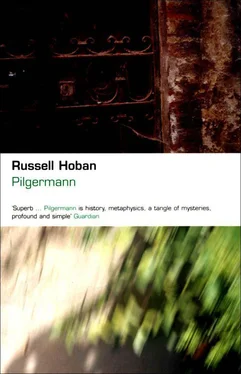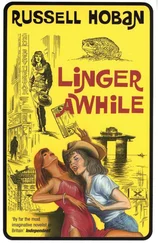Russell Hoban - Pilgermann
Здесь есть возможность читать онлайн «Russell Hoban - Pilgermann» весь текст электронной книги совершенно бесплатно (целиком полную версию без сокращений). В некоторых случаях можно слушать аудио, скачать через торрент в формате fb2 и присутствует краткое содержание. Год выпуска: 2002, Издательство: Bloomsbury Publishing PLC, Жанр: Современная проза, на английском языке. Описание произведения, (предисловие) а так же отзывы посетителей доступны на портале библиотеки ЛибКат.
- Название:Pilgermann
- Автор:
- Издательство:Bloomsbury Publishing PLC
- Жанр:
- Год:2002
- ISBN:нет данных
- Рейтинг книги:5 / 5. Голосов: 1
-
Избранное:Добавить в избранное
- Отзывы:
-
Ваша оценка:
- 100
- 1
- 2
- 3
- 4
- 5
Pilgermann: краткое содержание, описание и аннотация
Предлагаем к чтению аннотацию, описание, краткое содержание или предисловие (зависит от того, что написал сам автор книги «Pilgermann»). Если вы не нашли необходимую информацию о книге — напишите в комментариях, мы постараемся отыскать её.
Pilgermann — читать онлайн бесплатно полную книгу (весь текст) целиком
Ниже представлен текст книги, разбитый по страницам. Система сохранения места последней прочитанной страницы, позволяет с удобством читать онлайн бесплатно книгу «Pilgermann», без необходимости каждый раз заново искать на чём Вы остановились. Поставьте закладку, и сможете в любой момент перейти на страницу, на которой закончили чтение.
Интервал:
Закладка:
Strange, talking to a headless dead man. No face to look at, but from somewhere he was staring at me hard. ‘Judgment Day,’ he said. ‘You spoke of it just a little while ago. You must know in your heart, as I knew in my heart while I was alive, that the Day of Judgment is the only day there is. In our mortal life we play at dividing this one everlasting day into many tiny days and we say, “Tomorrow I shall perhaps do better.” But there is only this one day in which we live our whole lives and from which we fade as consciousness fades. It is where I am now but in a little while I shall fade out of it and be gone while you for as long as you live must remain in it.’
‘Is that why you told those peasants to let me live?’ I said. ‘So that I could suffer it continually?’
‘I told them to let you live because I felt myself judged in that moment when I looked down at you lying in your blood and vomit,’ he said.
We said nothing more. Bruder Pförtner was with us again, he was walking close beside my young death and fondling it from time to time.
Walking the road to Jerusalem I find myself weeping. This is because my mind has shown me a connexion that it was just beginning to perceive when I was leaning against the tree in the little dark wood after I killed Udo the relic-gatherer. It was then that there came into my mind the great dome that I had never seen, the dome of Hagia Sophia in Constantinople. Ah! now as I walk I know that there is no separateness in the world, I know that the souls of things and the souls of people are inextricably commingled; I know that the dome and the woman both are manifestations of something elemental that is both beauty and wisdom and it is for ever in danger, for ever being lost, torn out of our hands, violated. It is impossible to keep it safe. That heaven shapen by human hands, that blue dome hung with lights and lustres, starred with flames and dim with incense, that spirit-bowl, that God-mother and Mother Goddess, that Wisdom of stone and gold, how should it not be violated, how should rough hands not be laid upon it, how should the holy silence not be broken by the thudding of hooves, how should war horses not be ridden up to that altar, how should the altar not be smashed? Altars are made for smashing. That thing in us that waits to jump up and smash, it stands looking over our shoulder as we build the altar. It rages, it smiles, it laughs deep in its belly, it dances on cloven hooves at the consecration of the altar, it looks ahead to the time of the smashing. More, more is there in this: that of which the dome is a visible aspect, the great Wisdom, golden Wisdom itself, is the mother of both the altar and the thing that smashes the altar. The Wisdom in its wisdom thus provides that beauty and wisdom shall never be within our grasp, shall only be a light upon our eyes and passing.
Passing, passing! Echah! O how! O how is the beauty passing, how is it departed, gone, gone! It is gone because the Wisdom in its wisdom has ordained that beauty is that which passes, it is that which will not stay; beauty is a continual departing, a continual going away. Sophia is one with the dome in my mind that arches over me like the Egyptian sky goddess arching over her earth-god brother who penetrates her and must be separated from her.
In the making of Sophia’s beauty was the violation of it by separation, by departure, by shouts of impiety under the great dome of it, by the castration of its consort and the beheading of its protector. The great dome echoes with the clatter and the clamour of the horsemen, with the smashing of the altar, the tearing of the silken hangings. Listen, listen to the trampling of impious feet on sacred books, listen to this trampling that is the most constant road in history, the trampling of murderous feet on sacred books. In the writing, in the copying, in the binding of the books, in the very ink and paper, in the blood and bones of the original writer and in the blood and bones of every copyist thereafter lives coevally the trampler and the burner of the books of God and the God of books, lives the trampler and the burner of books and people, of beauty and domes.
I am on the road to Jerusalem with my dead colleagues, with Bruder Pförtner, with my death that is not yet ripened to term. The year is 1096 in the Christian calendar, Anno Mundi 4857, two thousand, four hundred and eight years since Moses brought down from the mountain the second tablets on the tenth day of Tishri. It will not be until A.D. 1204 that violent men mouthing Christ will sail from Venice to sack Constantinople. In the adzes and hammers of Venetian shipwrights not yet born, in their blood and bones, in the blood and bones of their mothers who will bear them waits to be born the sack of Constantinople and the fall of an emperor unborn, and all of this is under the dome of that Sophia who is or is not carrying my child, that Sophia who revealed her nakedness to me, gave it splendidly and lavishly to me, that Sophia, that nakedness that I shall no more see. Echah!
The above is my kina, my dirge, my lament that is suddenly in my mind as I recall walking with my colleagues on the road to Jerusalem. In my mind at the end of my lament on the inseparability of Sophia and Hagia Sophia is another thought: the enemy matters nothing; truly it is not the apparent enemy that sacks Constantinople, it is that which crouches always at the feet of beauty and in its season leaps up to destroy. It is the impulse that leaps up, and it gathers to itself whoever comes to hand whether it be Christians or Muslims; it clothes itself with whatever costume it finds. The fall of Constantinople that begins in 1204 with the French and the Flemings is consummated by the Turks in 1453; what is required is not that a particular enemy shall attack the dome, only that by sword and fire beauty shall be brought low, only that the holy books shall be trampled. Echah!
9
Now must I begin to speak of war, now must I make ready for dust and blood, for the smoke and flame of siege and battle, for the ringing of dinted iron, the quivering of severed limbs. Now must I see in my mind the secret colours of entrails sliding from the opened bellies of warriors while their eyes look down in disbelief. Now must I see Bruder Pförtner and his ready companions making sport while swords clang and arrows hiss all round them; now must I hear them screaming in their pleasure as they have the tumbling of heroes Christian and Muslim both.
What a ponderous labour is war, what preparations must be made years and years before the first blow is struck! Decades before the first battle must the first engines of war be brought into play: the first engines of war are men and women, they are the hammer and the anvil that in the heat of their action make soldiers. In order that the dead may be heaped on the walls and roofs and in the streets and houses of Jerusalem in 1099 there must be heavy coupling from about 1060 onwards among Christians and Muslims both. For the making of each soldier must a man and a woman labour in their lust, for the making of each soldier must an egg and a sperm conjoin to write their word of flesh, must a woman carry that word for nine months until her great-grown belly fulfils its term and is delivered of a man-child. Then must the boy be given suck, must he be kept alive to grow strong and active, must he be led safely past the ills of infancy and the perils of childhood to the day when he can take in his hands the weapons of war and go out to the place of killing.
Fields of grain and vegetables, herds of cattle must be grown to feed these ripening warriors. Wool of sheep, thread of flax, fur of fox and rabbit, hide of cattle must be grown to clothe and shoe the soldiers of Christ and Muhammad, and for this the sheep, the foxes and the rabbits, and the cattle must also couple tirelessly while the earth grows the sown seed in its belly. What chance would Mars have without the help of Venus? What hard breathing, what amorous sighing, what grunts of ardour and cries of joy sound in the gathered darkness of those soldier-making, soldier-feeding, soldier-clothing, soldier-shoeing nights!
Читать дальшеИнтервал:
Закладка:
Похожие книги на «Pilgermann»
Представляем Вашему вниманию похожие книги на «Pilgermann» списком для выбора. Мы отобрали схожую по названию и смыслу литературу в надежде предоставить читателям больше вариантов отыскать новые, интересные, ещё непрочитанные произведения.
Обсуждение, отзывы о книге «Pilgermann» и просто собственные мнения читателей. Оставьте ваши комментарии, напишите, что Вы думаете о произведении, его смысле или главных героях. Укажите что конкретно понравилось, а что нет, и почему Вы так считаете.












